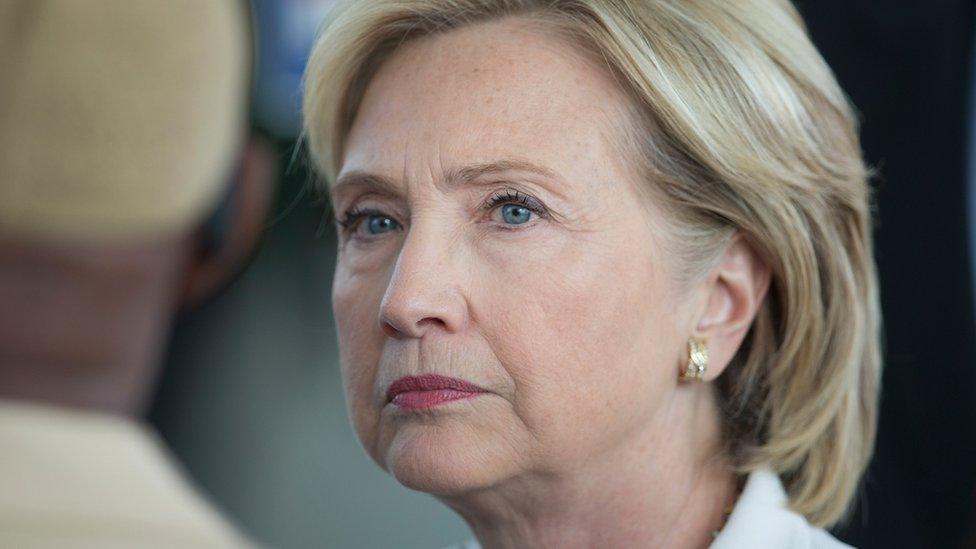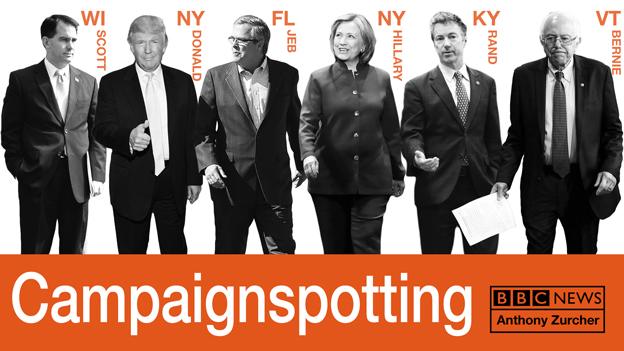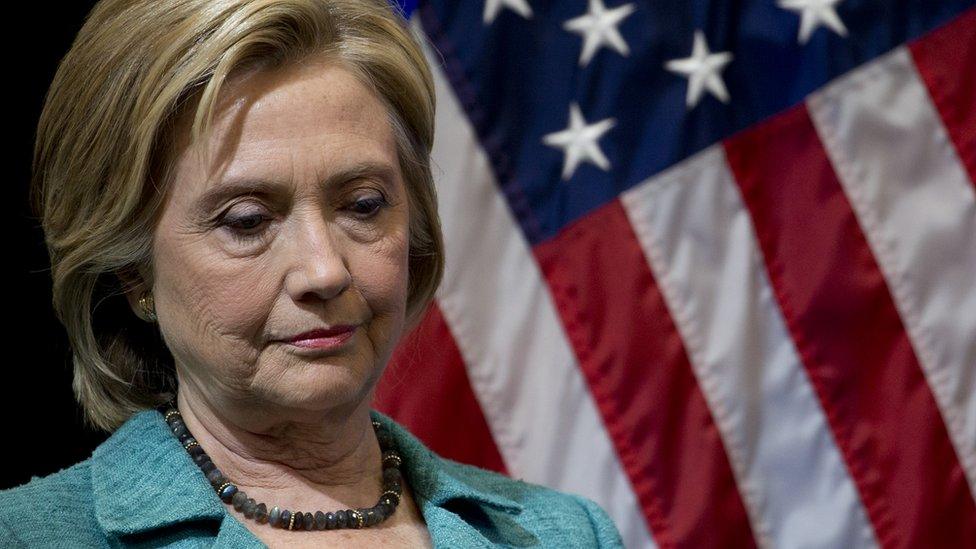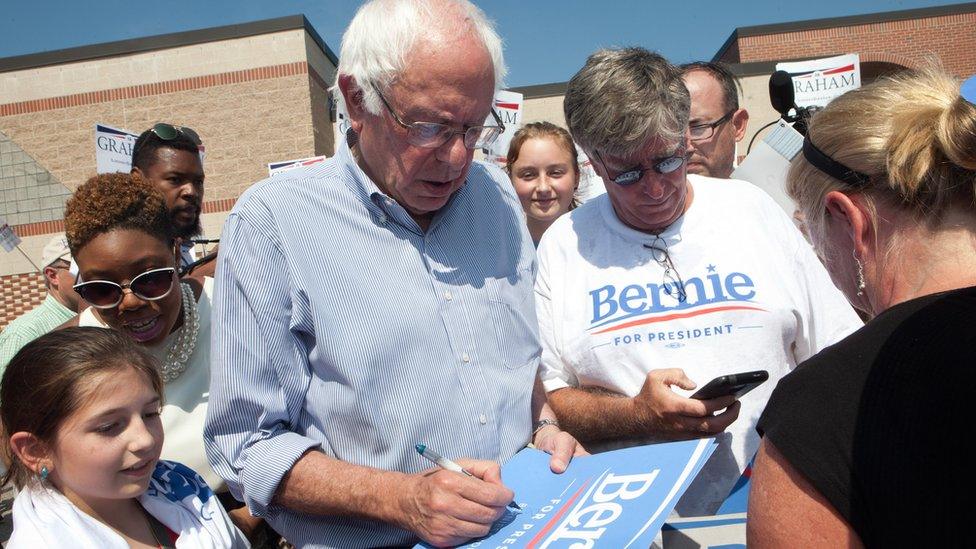Hillary's hard and painful road to 'sorry'
- Published
- comments

Hillary Clinton's retreat in the face of the persistent controversy over her use of an off-site email server while US secretary of state is now complete.
On Tuesday, for the first time, Mrs Clinton directly apologised for her decision to exclusively use private email for her official government duties.
"That was a mistake," she said during an ABC News interview. "I'm sorry about that. I take responsibility."
The admission is in stark contrast to Mrs Clinton's insistence when the story broke in March that she had nothing to apologise for and that her actions were within the boundaries of the law, no different - in manner if not extent - to those of her predecessors in office.
While she stands by the view of the legality of her actions, she now acknowledges the toll the story has taken on her political standing, as her public approval ratings have sagged.

"I do think I could have and should have done a better job answering questions earlier," she said. "What I had done was allowed, it was above board. But in retrospect, as I look back at it now, even though it was allowed, I should have used two accounts. One for personal, one for work-related emails."
She also posted a message, external on Facebook to her supporters reiterating those sentiments.
"I wanted you to hear this directly from me," she wrote.
For months Mrs Clinton had insisted in the propriety of her email activities, despite the occasionally embarrassing details contained in the thousands of publicly released messages she provided to the State Department and the revelation that some of her communications contained information that has since been labelled classified.

The email controversy has taken its toll on Hillary Clinton's public approval ratings
In an August speech in Iowa, Mrs Clinton even joked about the matter, telling a Democratic audience, external that she liked Snapchat messaging because the service's texts "disappear all by themselves".
Later that month, however, she acknowledged that Americans may have questions about her email set-up and that it would have been better to rely on government systems for work-related messages.
Then, last Friday - in comments that would presage Tuesday's round of contrition - Mrs Clinton told an NBC interviewer, external that she was sorry for the "confusion" the story created and that the email setup "wasn't the best choice".
According to, external the New York Times, the Clinton campaign had recently conducted a focus group in the key early primary state of New Hampshire on Mrs Clinton's email-related comments. The results reportedly indicated that the issue "was drowning out nearly everything else that Mrs Clinton was hoping to communicate to voters" and that the former secretary of state must take more steps to address the controversy.
Mrs Clinton now plans to "address the email controversy more openly, and with a tone of humility rather than defensiveness".
This will likely do little to quell Mrs Clinton's critics, who insist that the Democrat's email setup jeopardised national security and flouted freedom of information laws.
"By any objective measure, the Democratic presidential front-runner has responded to her email scandal with deflection and deception, shredding her credibility while giving a sceptical public another reason not to trust the institutions of politics and government," writes, external the National Journal's Ron Fournier. "An apology doesn't fix that."
Mrs Clinton's change of tactics could be part of what's being billed as a larger strategy on the part of her campaign to have the candidate show more humour and heart, reports, external the Times, and "bring spontaneity to a candidacy that sometimes seems wooden and overly cautious".
This kind of talk is often a flashing red warning light of a campaign in a nosedive. Although the tenor of Mrs Clinton's media coverage and the trajectory of her poll numbers should be of concern for the candidate, it's important to keep in mind that the fundamentals of the race for the Democratic nomination still weigh heavily in her favour.

Bernie Sanders is presenting a growing challenge to Mrs Clinton in early voting states
She still has a powerful fundraising apparatus to finance her campaign. The Democratic Party establishment is, by and large, in her corner. And rank-and-file Democratic voters continue to view her positively on the whole.
Independent Senator Bernie Sanders, with his unvarnished populist appeal, has cut into her support in early voting states and even pulled ahead in numerous recent New Hampshire polls, but his ability to wage an effective campaign in the later states is in doubt.
Vice-President Joe Biden continues to drop hints that he's considering entering the fray if, in his words, external, he can devote his "whole heart" and "whole soul" to the race.
"The honest-to-God answer is I just don't know," Mr Biden told a Florida audience last week.
Even if he does launch a bid, there's no guarantee he would be able to beat the former first lady - and, in fact, the presence of a high-profile opponent could help Mrs Clinton dispel the damaging notion that her presidential bid is nothing more than a pre-ordained coronation.
Unlike the Republican race, where time is short for candidates jockeying for poll position and financial support, it's still early in the game for a dominant front-runner like Mrs Clinton.
Despite the signs of doubt and seeds of panic, time - for now - is on her side.